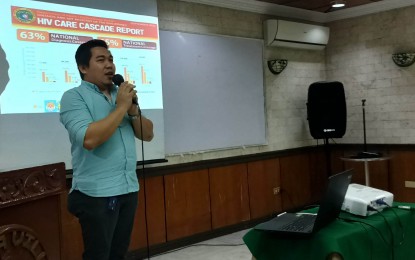
HIV CASES. Nurse 1 Errol Dayot says the Department of Health-Western Visayas Center for Health Development will be employing additional strategies to reach out and diagnose over 4,000 estimated persons living with human immunodeficiency virus in the region in a media forum on Wednesday. He said that while they have already deployed field staff for community-based screening, they intend to also implement the self-test as well as the sexual and social network strategies next year. (PNA photo by Perla Lena)
ILOILO CITY – The Department of Health-Western Visayas Center for Health Development (DOH-WVCHD) will use additional strategies to reach out to and diagnose over 4,000 estimated population of persons living with human immunodeficiency virus (PLHIV) in the region.
As of September, the region has accounted 6,197 persons with HIV.
The highest number are from Iloilo province with 1,246; Iloilo City and Negros Occidental with 1,086 each; Bacolod City has 834; Capiz, 524; Aklan, 414; Antique, 320; and Guimaras, 100, DOH WV CHD Nurse 1 Errol Dayot said in a media forum on Wednesday.
“For Western Visayas, our estimated persons living with HIV is around 1,200. We are around 6,297, that’s around 60 percent of our estimated population,” he said.
He said based on the 95-95-95 global target in terms of diagnosis, treatment and level of viral load suppression, respectively, the region is at 60 percent on diagnosis, roughly 79 percent on treatment and 94-95 percent in viral load suppression.
Dayot said there are field staff deployed to the barangay level for the community-based screening to reach out to the target PLHIV who have yet to get proper diagnosis.
“There are other modalities that we implement. Gradually we have the self-test as well as the sexual and social network that we will implement next year,” he said.
The self-test was piloted back in 2020 with the World Health Organization and will be reintroduced next year with the support of the Global Fund.
The sexual and social network works like a referral system among sexually-active individuals.
Dayot also emphasized the importance of early diagnosis, as the mode of transmission is not just limited to homosexual, bisexual and heterosexual.
The region has recorded eight incidents of mother-to-child transmission, one due to blood transfusion and 87 were unknown.
Of the over 6,000 diagnosed positive PLHIV, 20 are pregnant. (PNA)
